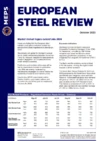UK to make EAF shift after British Steel plan approval
Imports and scrap prices will have a growing influence on the United Kingdom’s steel industry following confirmation of a wholesale shift to electric arc furnace-based (EAF) production.
British Steel was granted planning permission to build a new EAF at its headquarters in Scunthorpe, Lincolnshire, this week. The development will complete its transition away from the use of blast furnaces following the approval of plans to build an EAF at its other UK steelmaking operation, in Teesside, in early April.
Tata Steel UK has also confirmed, in April, that it intends to press ahead with plans to shut down its blast furnaces this year, as it shifts to EAF production.
The two steelmakers’ plans signal the end of UK steel production using blast furnaces.
Influence of EAF shift
While Tata claims that its scrap-based EAF steel production operation in Port Talbot could be completed by 2027, it will rely on imports to satisfy customer orders until then. British Steel intends to maintain its blast furnace operations as it carries out its proposed £1.25-billion transformation, which remains subject to support from the UK Government.
MEPS International’s head of price analysis and forecasts, Kaye Ayub, this week highlighted the likely effects of the move to electrify the UK steel industry. She said that the move across to electric steelmaking will make the UK mills “better able to react to the ever-changing demand-side dynamics of the market” as well as providing “more environmentally sustainable steel in the longer term”.
But she added: “It will take time for those new furnaces to be built. We hear a lot of concerns from buyers in the market about how the availability of steel will be affected during the transition phase and the potential for higher carbon-emitting material to be imported in that period.
“There is also the potential for steel scrap prices to rise once these electric arc furnaces are on-line.”
The UK Steel trade body recently called for tight controls to regulate the export of scrap ahead of the anticipated surge in demand prompted by the nation’s shift to EAF production. Currently, around 80% of the 10 million tonnes of scrap produced in the UK each year is sold to overseas steelmakers.
Emissions-cutting agenda
British Steel claims that its move to EAF-based steel production will reduce its carbon emissions by around 75%. This aligns with the UK Government’s target of realising a 95% emission reduction from steelmaking by 2050. It has previously been reported that British Steel had been offered £300m in government funding to support its shift to decarbonisation plans.
Both British Steel and Tata will make job cuts as part of the move away from blast furnaces, however. Union bosses have previously said that around 2,000 jobs could be lost in North Lincolnshire. Tata’s changes – which have secured around £500m in government grants – could result in closer to 3,000 job losses, unions suggest.
Commenting on British Steel’s decarbonisation plans, company president and chief executive, Xijun Cao, said that it was now “crucial” that the business now secures the backing of the UK Government.
He added: “Our owner, Jingye, is committed to the unprecedented investment decarbonisation requires and our desire to dramatically reduce our carbon footprint, coupled with challenging market conditions, means it is imperative swift and decisive action is taken to ensure a sustainable future for British Steel.”

Source:
European Steel Review
The MEPS European Steel Review is an informative, concise and easy-to-use monthly publication, offering unique professional insight into European carbon steel prices.
Go to productRequest a free publication






